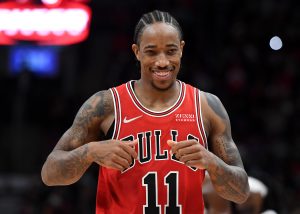When Jayson Tatum signed a maximum-salary rookie scale extension with the Celtics in 2020, the deal included a “Rose Rule” clause that allowed him to increase the potential overall value of the contract. Tatum’s starting salary on his extension in 2021/22 would be 30% of the cap if he made an All-NBA team in 2021, or 25% of the cap if he didn’t.
If Tatum had earned an All-NBA spot last season, his five-year contract would’ve been worth $195.6MM. However, he narrowly missed out, receiving the most votes of an player who didn’t make the cut (and more votes than one player who did, at another position). As a result, his five-year deal is worth $163MM.
Appearing on J.J. Redick’s The Old Man and The Three podcast (video clip), Tatum questioned the process that cost him more than $32MM, explaining that he became frustrated reading articles and listening to podcasts where media members made and explained their All-NBA selections.
“I specifically remember one (voter) saying, ‘I’m not a fan of his shot selection, so I just couldn’t put him on my All-NBA ballot,'” Tatum said. “And I was baffled. The fact that somebody could have thought and basically cost someone $30 million dollars… Forget about me, say the next rookie extension guys that come in. I think that has to change.
“Because there’s no criteria set for the voters on who should they vote for. It’s all opinion-based. There’s no, like, ‘He should have to play this many games’ or ‘They should be in the playoffs’ or ‘Average this many points.’ It’s all, ‘Well, I like this guy a little bit more’ or certain things like that, and I think there’s just a little too much on the line for that.”
The NBA’s Rose Rule allows players coming off their rookie scale contracts to qualify for a maximum salary worth 30% of the cap instead of 25%, while the Designated Veteran rule allows players with more years of NBA experience to qualify for a max worth 35% of the cap instead of 30%. These rules are what we refer to when we talk about a player qualifying for a “super-max” contract.
In each case, the player must make an All-NBA team (or win a Defensive Player of the Year award) in either the most recent season or in two of the three most recent seasons in order to be eligible for the higher maximum salary.
Tatum made the All-NBA team in his third NBA season in 2019/20, then signed his rookie scale extension prior to his fourth season. However, because his extension didn’t go into effect until his fifth year in the NBA, he needed to make an All-NBA team again in year four in order to qualify for the “super-max.” That didn’t happen.
In his conversation with Redick, Tatum acknowledged that having to “settle” for $163MM instead of $195.6MM shouldn’t earn him any sympathy and insisted he’s not upset specifically about that.
“I think the narrative was, ‘Jayson didn’t make All-NBA, he loses $30 million,'” Tatum said. “And from that headline, nobody’s going to feel bad for me. I still got $175 million, nobody’s going to feel bad, and I don’t want anybody to feel bad about the money part. My lifestyle hasn’t changed, it’s not about that.
“I think just as the results came out and I looked at how people voted, what went into the media members’ process of voting, that was the frustrating part.”
 No team has been able to pull away from the pack in the East so far, with the 38-21 Bulls currently hanging onto the No. 1 seed by a half-game. If the season were to end today, Chicago’s .644 winning percentage would be the lowest mark for a conference’s top seed since Detroit went 50-32 (.610) in 2002/03.
No team has been able to pull away from the pack in the East so far, with the 38-21 Bulls currently hanging onto the No. 1 seed by a half-game. If the season were to end today, Chicago’s .644 winning percentage would be the lowest mark for a conference’s top seed since Detroit went 50-32 (.610) in 2002/03.